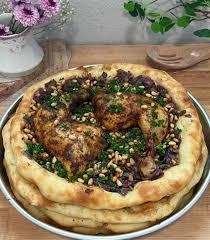What Is the National Dish of Palestine? A Complete Guide

What Is the National Dish of Palestine? A Complete Guide
Palestinian cuisine is one of the oldest and most soulful food traditions in the Middle East. Rich with olive oil, spices, grains, and centuries-old cooking methods, it reflects the story of a resilient people and a land known for its deep cultural roots. Among all the dishes that make up this culinary heritage, one dish is widely celebrated as the national dish of Palestine: Musakhan.
In this blog, we explore what Musakhan is, why it holds national significance, how it is prepared, and what makes it a proud symbol of Palestinian identity.
Understanding Musakhan — The Pride of Palestine
Musakhan (also spelled Msakhan) is a traditional Palestinian dish made with roasted chicken, caramelized onions, sumac, olive oil, and warm flatbread—usually taboon bread, baked in a clay oven. The dish has a rustic charm and is typically served in large communal platters meant to be shared by family and friends.
The name “Musakhan” comes from the Arabic word meaning “heated” or “warmed.” Historically, the dish was prepared during the olive-harvest season, when freshly pressed olive oil was abundant. Olive oil from Palestine is considered among the finest in the world, and Musakhan is a celebration of this golden ingredient.
Why Musakhan Is Considered the National Dish
Musakhan did not become the national dish by accident. It is deeply connected to Palestinian life, agriculture, and the concept of hospitality. There are several reasons why it is embraced as a national symbol:
1. It Represents the Land
The core ingredients—olive oil, onions, sumac, and taboon bread—are all products of the Palestinian landscape. Olive groves are central to Palestinian heritage, and Musakhan honors this connection.
2. It Symbolizes Community & Family
Musakhan is always served on a large platter and eaten with the hands. It is a dish meant to bring people together, often served during family gatherings, celebrations, and seasonal festivals.
3. It Preserves Culinary Tradition
Much of Palestinian cuisine is passed down through generations. Musakhan has remained largely unchanged in its preparation and ingredients, making it a powerful link to cultural identity.
4. It Highlights Palestinian Hospitality
In Palestinian homes, offering Musakhan is considered a generous gesture. It reflects warmth, respect, and the importance of sharing food with guests.
Ingredients That Make Musakhan Special
Each part of Musakhan has significance:
-
Taboon Bread: Traditionally baked on small stones inside a clay oven. Its texture and ability to absorb flavors make it the perfect base.
-
Sumac: A tangy red spice that gives Musakhan its signature color and taste.
-
Caramelized Onions: Slow-cooked in olive oil until soft, sweet, and deeply flavorful.
-
Olive Oil: The soul of the dish. Palestinian olive oil is rich, aromatic, and essential to the dish’s authenticity.
-
Roasted Chicken: Spiced and baked until tender, then arranged beautifully over the onion-soaked bread.
How Musakhan Is Traditionally Prepared
The preparation of Musakhan is as meaningful as the dish itself. Traditionally, women gather in the kitchen to prepare large quantities during festive seasons.
Here’s how it is made:
-
Caramelizing the Onions: Sliced onions are cooked low and slow in generous amounts of olive oil until they turn golden and sweet.
-
Seasoning with Sumac: Sumac, salt, and sometimes cardamom or allspice are added to infuse the onions.
-
Roasting the Chicken: Chicken pieces are seasoned and roasted separately until the skin is crisp and the meat is tender.
-
Assembling the Dish: Taboon bread is laid out, soaked with olive oil and onion juices, topped with more onions, and finally decorated with the roasted chicken.
-
Finishing Touch: Pine nuts or almonds toasted in olive oil are sprinkled on top.
The result is a dish that is rich, aromatic, and deeply satisfying.
Musakhan in Modern Palestinian Culture
Even today, Musakhan remains a beloved dish across Palestine and the global Palestinian diaspora. It is served at weddings, community gatherings, and national events. Many restaurants offer their own interpretations, but the traditional homemade version remains unmatched.
Musakhan has also become a symbol of cultural pride. In 2010, Palestinians in the West Bank even prepared the world’s largest Musakhan, gaining international attention and showcasing their culinary heritage with pride.
The National Dish and the Palestinian Identity
Musakhan is more than food—it is a story. A story of land, family, culture, and resilience.
Its simplicity reflects modest rural life.
Its flavor represents heritage.
Its method of serving symbolizes togetherness.
In every bite, you experience the essence of Palestinian identity.
Exploring More of Palestinian Cuisine
If Musakhan is the heart of Palestinian cuisine, the rest of the food culture is the soul that completes the experience. From Maqlouba to Gaza-style seafood dishes, Palestine offers a world of flavors worth discovering.
To explore more authentic dishes and enrich your understanding of Palestinian cooking, you can read this detailed guide to the best Palestinian food. It provides a great overview of iconic recipes, cultural significance, and traditional flavors.
Final Thoughts
So, what is the national dish of Palestine?
The answer is clear and universally celebrated: Musakhan.
It is a dish that captures the warmth of Palestinian homes, the richness of its olive oil, and the deep-rooted traditions that bind its people. Whether you're exploring Middle Eastern cuisine for the first time or reconnecting with your heritage, Musakhan is a beautiful and delicious place to begin.
Palestinian cuisine is a journey—one filled with history, flavor, and heart. And Musakhan stands proudly at its center.
- Art
- Causes
- Crafts
- Dance
- Drinks
- Film
- Fitness
- Food
- Giochi
- Gardening
- Health
- Home
- Literature
- Musica
- Networking
- Altre informazioni
- Party
- Religion
- Shopping
- Sports
- Theater
- Wellness


